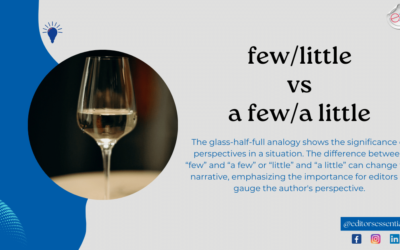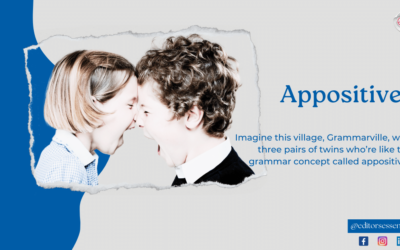In my previous post I talked about the use of since and because and how they are different or same. This piece is more a hangover due to the previous post. After having thought and talked about the grammar side of since vs. because, I still felt the previous post was not complete. While I talked more about the perfect tenses, object of since, and other things, I also realized that this is not how I approached the conundrum while editing. So do many seasoned editors. And sometimes even when the customer’s specification was not to change since to because, I did make a change; it’s more of a feel than of the grammar. Then there was a reflection on this question: Why did I change? Was it out of habit? Perhaps not, because there were many instances where since was not disturbed. In fact, to me the word since has more charm than because. Try it out yourself: write sentences with since and because as conjunctions and read the sentences aloud. The sentence with since is music to ears, isn’t it? It is, or it may not. Whatever be the preference, is there any logic behind the choice of these words? It looks like there is. Google helped and here is my understanding on this dubious pair of words.
As you started digging deeper, you realize that there is this feeble as to mean the same thing and to add to the confusion. So it is not just the choice between two words now, but between three words. The consolation comes from the fact that the choice of as is not as complex as the other two words.
One of the criteria to choose between the three, according to the online Cambridge dictionary, is how formal your writing is. Because is less formal than the other two. Personally, as sounds more colloquial, let alone more formal.
Another criterion is the writer’s emphasis. As conjunctions these words provide reason-clauses. There is an action, and there is a reason. The choice of the word is based on which is emphasized, the main clause or the subordinating reason-clause. If the emphasis is on the reason, use a because-clause. If the emphasis is on the action, use since or as.
A caveat. because and because of are not the same. Because, as we have talked so frequently now, is a conjunction; because of is a prepositional phrase. Bearing the risk of being naive, let me state that we cannot replace because with since in the latter case.
There is another phrase that creates nuisance to editors: due to. But let that be reserved for a later occasion.
What is your take? Do you have any peeves on the choice between these words?




A caveat now. Because and because of are the same. The former, as we have talked so frequently now, is a conjunction; the latter is a prepositional phrase.
‘Former’ and ‘later’ burden your reader to go back and match up what belongs to what.
A suggested rewrite:
A caveat. Because and because of are the same. ‘Because’, as we have talked so frequently now, is a conjunction; ‘because of’ is a prepositional phrase.
Or just
Note: ‘Because ‘is a conjunction; ‘because of’ is a prepositional phrase.
Regards
Rao
Welcome to Editor’s Essentials and thank you for the suggestion. I’ve taken your first suggestion.